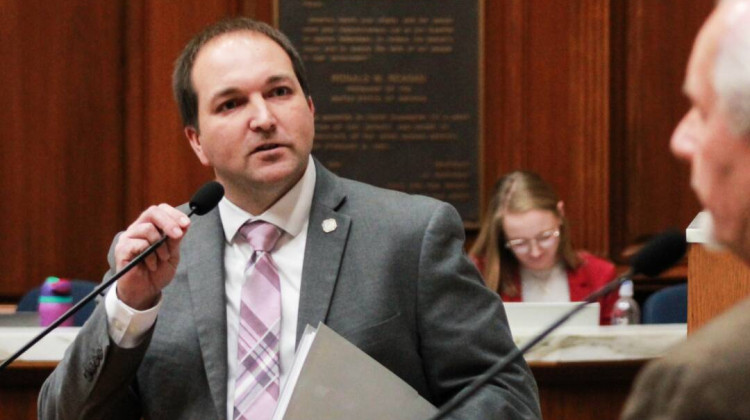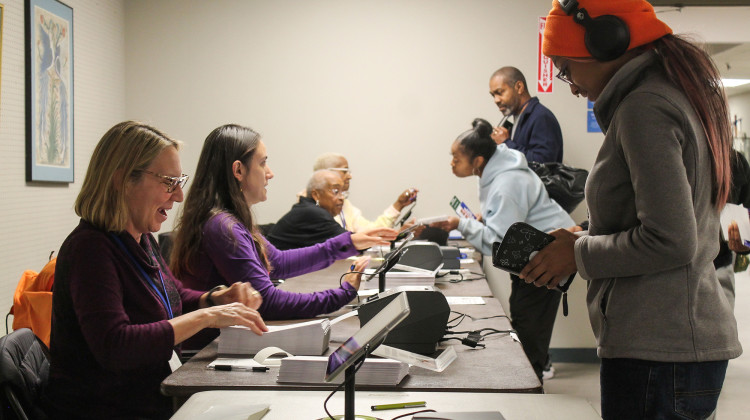
A bill that would limit discussions of human sexuality in early learning classrooms passed through its second Senate reading with some big changes. Critics say the bill is part of a "slate of hate" against the LGBTQ+ community.
Lauren Chapman/IPB NewA bill that would limit discussions of human sexuality in early learning classrooms passed through its second Senate reading with some big changes. Among them are changes to a portion that would require parents to be notified about requested changes for a student's names and pronouns, and the removal of other portions of the bill.
“Parental notification” changes
HB 1608 would still require teachers to notify parents if students request a name, title or pronoun change in the classroom. However, the newly amended legislation would not require parental consent for schools to honor the request for a student’s name or pronoun changes.
Richard Brandon-Friedman is an assistant professor for social worker at IUPUI.
He said this is a positive change – as this type of regulation on consent would’ve been confusing.
“If a parent were to say, no, we don't want that to happen, I don't know how a school would address that, and I don't think that's addressed well in this bill,” he said.
However, he feels that mandating that information about a student’s gender or pronouns is revealed to parents is still an issue.
“Confidentiality is the root of what we do in social work and clinical services,” Brandon-Friedman said. “So I feel that trying to force us to violate that is just inherently problematic and unethical.”
While there was some discussion of not notifying parents about this information about their students at all during the hearing, leaders testified parents should still be notified. This points to a larger push for “parental rights” throughout the session, with many advocates for bills that would allow parents the right to know information about their children.
Removal of “religious conviction” and immunity from punishment
The initial version of this bill included an amendment that said teachers would not be penalized if they refuse to use a child’s requested name or pronoun inconsistent with their legal name if this was done so out of religious conviction.
There is an ongoing court case over this precise issue.
John Kluge lost his job in Brownsburg Community Schools after he refused to comply with the district's policy which allowed students to change names and pronouns with the approval of a parent and a health care professional. This part of the bill was removed.
In prior hearings, lawmakers discussed confusion with this portion of the bill – with many Democratic lawmakers saying their religious convictions would encourage them to honor changed names and pronouns for children.
Join the conversation and sign up for the Indiana Two-Way. Text "Indiana" to 73224. Your comments and questions in response to our weekly text help us find the answers you need on statewide issues throughout the legislative session. And follow along with our bill tracker.
Confidentiality concerns
The bill still says school psychologists, nurses, social workers and counselors are “not required to violate a federal law or regulation” in order to follow this proposed legislation.
However, Brandon-Friedman said this leaves out professional codes of ethics, which he said could be violated in following this state law.
“If we are within the state of Indiana and licensed within the state of Indiana, we are bound by our code of ethics,” he said. “And this is asking us as clinicians to make a decision to either follow our code of ethics, which we've committed to as our profession, or to follow the Indiana code.”
An amendment to exempt physicians and social workers from this notification if it violated their code of ethics did not pass.
Brandon-Friedman said this creates a disconnect, particularly for social workers, between their required duties by the state and their code of ethics.
“Youth, as well as any person who goes to a clinician, deserve to have the right to be able to speak about what is bothering them and have services provided to them without a fear of the clinician going and informing someone else about it,” he said.
Human sexuality content remains the same
A major concern within the bill is the limiting of “human sexuality” teachings in pre-kindergarten through third-grade classrooms.
Many against the bill argued this term is too broad, and may create a chilling effect.
Brandon-Friedman said this language could also be seen as an attack on LGBTQ+ students.
“I think that's inherently problematic as well because it's poorly defined or not defined at all,” he said. “And it can easily be construed to suggest that any discussion of homosexuality or LGBTQ identities is part of human sexuality.”
In an earlier hearing, bill author, Rep. Michelle Davis (R-Whiteland), shared her take on the definition of human sexuality.
“Human sexuality is just the way people experience and express themselves sexually,” she said.
However, Brandon-Friedman said there are still questions about what this applies to. He said he fears this will limit the teaching of LGBTQ+ material in schools.
“They [LGBTQ+ youth] deserve to be educated on age-appropriate material from the time of their beginning in school,” he said. “And when you start to say that certain topics, certain identities are okay to discuss after third grade and not, that's telling youth and even older LGBTQ+ youth that some people are too young to even know that you exist.”
He said this may also create confusion for LGBTQ+ teachers – specifically on how they may be allowed or not allowed to share their sexuality or information about their families.
Critics of the bill say it is a part of this session’s “slate of hate” – a group of anti-LGBTQ+ bills filed by legislators during this legislative session.
The bill now goes to the full Senate for a vote. If passed, the House would have to approve the changes or go to a conference committee before it is sent to the governor’s desk.
Violet is our daily news reporter. Contact her at vcomberwilen@wfyi.org or follow her on Twitter at @ComberWilen.
9(MDAyMzk1MzA4MDE2MjY3OTY1MjM5ZDJjYQ000))
 DONATE
DONATE






 Support WFYI. We can't do it without you.
Support WFYI. We can't do it without you.